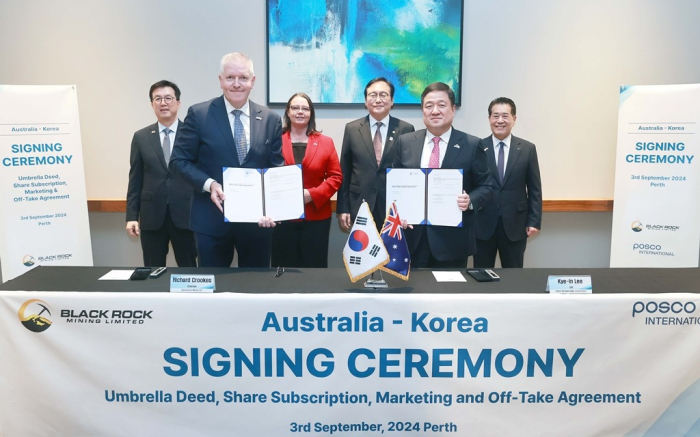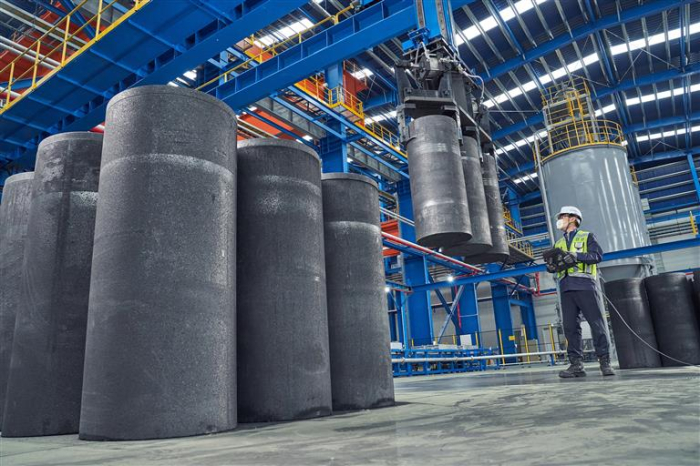Batteries
POSCO to invest in Tanzanian mine to cut Chinese graphite imports
POSCO Int'l to sell low-purity graphite from the Mahenge mine; POSCO Future M to use high-purity graphite for anodes
By Sep 03, 2024 (Gmt+09:00)
3
Min read
Most Read
Samsung steps up AR race with advanced microdisplay for smart glasses


When in S. Korea, it’s a ritual: Foreigners make stops at CU, GS25, 7-Eleven


Maybe Happy Ending: A robot love story that rewrote Broadway playbook


NPS yet to schedule external manager selection; PE firms’ fundraising woes deepen


US auto parts tariffs take effect; Korea avoids heavy hit



POSCO Group, South Korea’s steel and battery material conglomerate, is set to invest in the world's second-largest graphite reserve, in Tanzania, to reduce imports of the mineral from China.
POSCO International Corp., the group’s general trading unit, on Tuesday agreed to buy a 19.9% stake in Australia's Black Rock Mining Ltd. for $40 million, which is developing the graphite mine in Mahenge, Tanzania.
The Australian company has an 84% stake in the Mahenge Graphite Project estimated to host some 6 million tons of natural graphite.
POSCO Holdings Inc., the parent of South Korea’s sole anode producer POSCO Future M Co., aims to reduce its dependence on graphite from China used for electric vehicle battery anodes, the negatively charged part of the battery, to zero and use only its own. The group has also been trying to secure other battery minerals such as lithium, cobalt and nickel from other countries.
The US plans to stop providing tax incentives on EVs equipped with batteries containing graphite from China in 2027.
“We will continue to discover projects that contribute to improving the global competitiveness of the national key industries such as secondary battery materials,” said POSCO Chairman Chang In-hwa.
“We also plan to use the group’s various business portfolios and global networks to establish supply chains for national security.”
South Korea is home to major global EV battery makers including LG Energy Solution Ltd., SK On Co. and Samsung SDI Co., which heavily rely on raw materials from China. About 90% of graphite consumed on the peninsula is reportedly from the mainland.
TO DOUBLE GRAPHITE PROCUREMENT
POSCO International is set to secure an additional 30,000 tons of natural graphite a year from the Tanzanian mine through the investment in Black Rock Mining as the South Korean company commits to joining the second phase of the project. It has already been participating in the first phase, signing a deal in May 2023 to secure the same volume for 25 years.
The company is scheduled to procure the graphite from 2026 when the mine with an annual capacity of 89,000 tons starts operations.
Black Rock Mining plans to increase the capacity to 347,000 tons a year through further developments, which POSCO International aims to join.
The deal allows POSCO International to sell some of the graphite from the mine, industry sources said. The mine is set to both high-purity graphite, which is used for battery anodes, and low-purity graphite, which is used for steel, cement and auto parts.
The trading company secured rights to sell the low-purity graphite worldwide, while POSCO Future M uses high-purity graphite.

TO DIVERSIFY GRAPHITE SOURCES
POSCO Group is diversifying graphite supply sources by participating in mine development projects in African countries such as Mozambique and Madagascar.
The conglomerate is also ramping up production of artificial graphite in South Korea.
Those measures were expected to meet much of POSCO Future M’s estimated needs of 120,000-200,000 tons of graphite a year by 2027, industry sources said.
South Korea is also supporting domestic battery materials manufacturers. The Ministry of Trade, Industry and Energy set up a 5 trillion won ($3.7 billion) fund for supply chain stabilization to provide financial support such as loans with low interest rates to battery materials producers such as POSCO Future M.
Write to Sang Hoon Sung at uphoon@hankyung.com
Jongwoo Cheon edited this article.
More to Read
-
 Business & PoliticsBiden exempts graphite from EV mineral sourcing rule in win for Korea
Business & PoliticsBiden exempts graphite from EV mineral sourcing rule in win for KoreaMay 05, 2024 (Gmt+09:00)
3 Min read -

-
 BatteriesS.Korea's Posco International secures graphite in Africa
BatteriesS.Korea's Posco International secures graphite in AfricaSep 04, 2023 (Gmt+09:00)
1 Min read -

-
 BatteriesPOSCO acquires stake in Tanzania graphite mine to boost battery materials biz
BatteriesPOSCO acquires stake in Tanzania graphite mine to boost battery materials bizJan 18, 2021 (Gmt+09:00)
2 Min read
Comment 0
LOG IN


